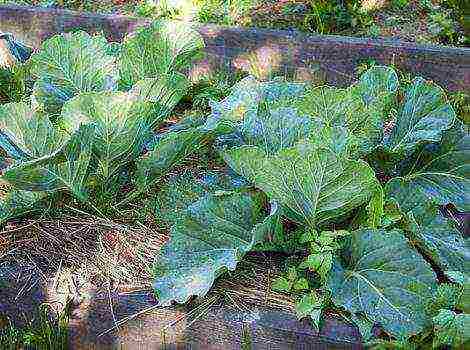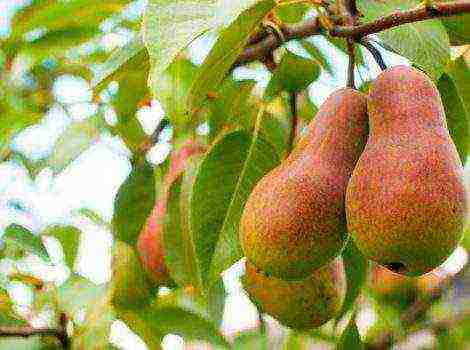Content
Paul Sorano (Paul Sorano) is the head of Lyndon Lyon Greenhouses, famous among all violet lovers. Violets of the varieties bred by this company have long won the hearts of Saintpaulists all over the world. LLG turns 55 this year, the founder of the company is Paul Sorano's grandfather Lyndone Lyone. Paul Sorano succeeded Lyndon Lyon, his grandfather, in 1993. From that moment on, his life has undergone changes. Today he is the author of the favorite and world-famous varieties. At the invitation of the head of the store "House of Violets", Vladimir Kalgin, Paul Sorano came on a visit to Moscow. His favorite colors of violets are coral, red, dark purple. In violets he most of all appreciates the chimeric and fantasy colors. In his six greenhouses they work constantly three people, an employee Barbara, he and his daughter. Also two people work half a working day, whose duties include collecting orders for shipment, they. The criteria by which Paul Sorano selects seedlings are novelty, beauty, demand. When asked what varieties he could give to Mr Putin, he pointed to the varieties: Optical Illusion
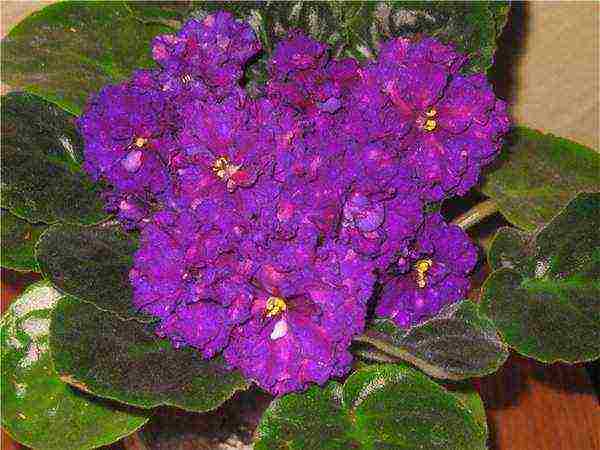
- for its unusual color, Tinny Bopper as the smallest, Spectasular as the owner of large flowers
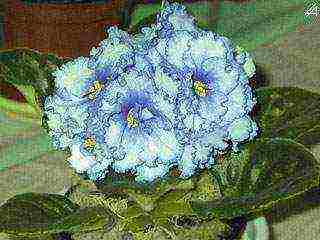
as well as Irish Flirt

which is the winner of many exhibitions. This variety, according to the breeder, is his best achievement. Saintpaulia, perfect in his opinion, is a violet that has the color of a yellow daffodil. Paul Sorano lives only with flowers, he considers going to exhibitions with his flowers as a vacation. The length of his working day sometimes reaches 14 hours. Together with him in the house live two cats which are 15 years old, he has no wife. Having visited Russia, he visited both Moscow and St. Petersburg
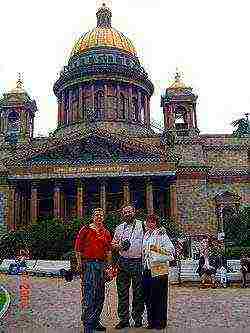
and Kiev.
His most famous selections
Playful spectrum
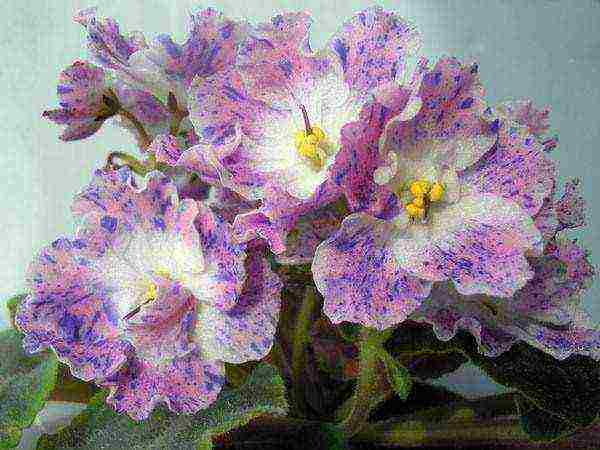
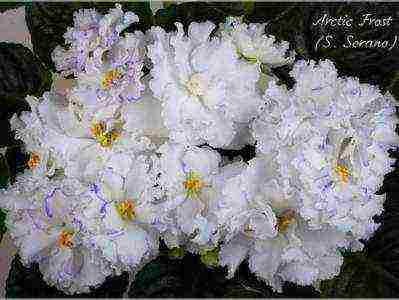
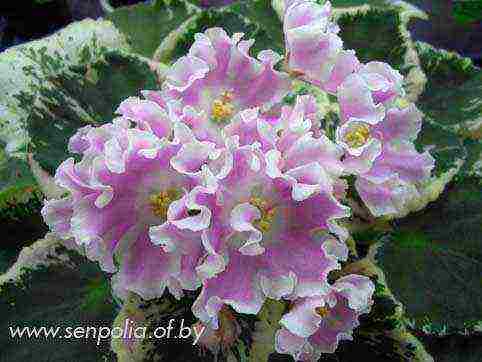
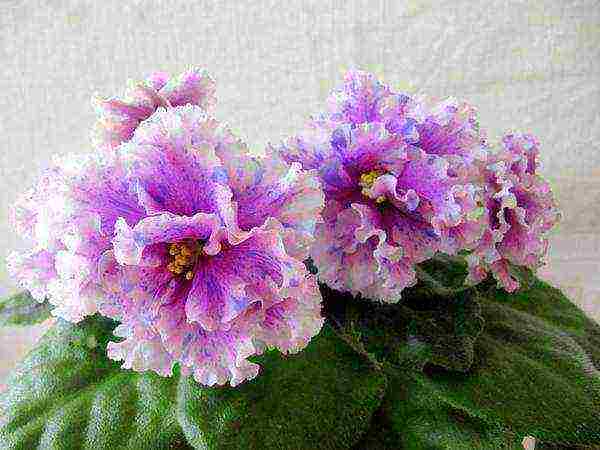
As a result of the painstaking work of scientists the classic violet with blue flowers became the progenitor for a large number of new varieties... Violets are distinguished by a variety of shapes and shades. Double or semi-double flowers appeared. The colors have mixed with each other, now on the windowsills of avid collectors you can contemplate violets with patterns, spots, stains, blotches, stripes and contrasting borders. What are violets? Let's take a closer look at the most popular varietal violets described in this article.
Types and varieties of Saintpaulia, a description of a houseplant
All violets were divided into several groups to facilitate orientation among the many species. There are three groups:
- collectible;
- variegated;
- industrial.
Variegated varieties are characterized by the brightest color of the leaves, which can be painted in different colors... They often have a border at the edges. The first variegated varieties bloomed small and uncomplicated sotsveia, but later breeders bred species that were distinguished by large double flowers of different colors.
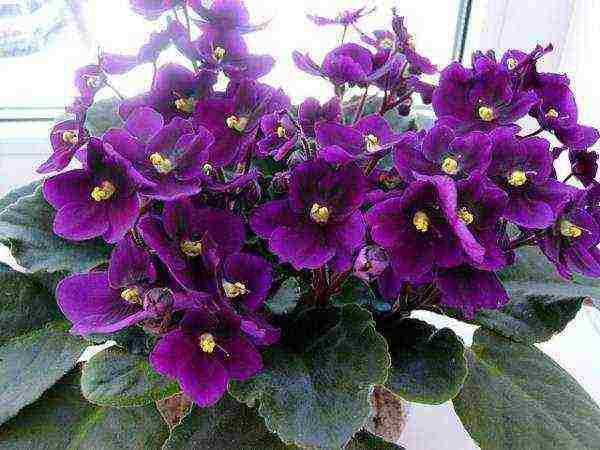 Industrial dutch violet
Industrial dutch violet
Industrial - designed for mass cultivation on special plantations... They are available for purchase in large quantities. Their appearance is the simplest.Basically, these plants are used to decorate banquet halls, they are placed in offices and government agencies. These varieties bloom actively for a long time.
They require minimal maintenance, so they are often grown at home.
Collectible
They are characterized by large inflorescences ranging in size from five to seven centimeters. They differ from others in that they are almostthey have large wavy double petals, painted in the widest range of colors: from pure white to deep blue shades. The leaves are also of different colors and have wavy edges.
Violets of these varieties are collected by collectors and shown at exhibitions.
The most beautiful and unusual varieties are collected at exhibitions. Difficult collectible varieties require more time and effort to grow successfully and care properly. Labor is rewarded with gorgeous flowering. Collectible violets include: Lemon Snow, Willodene, Gift for a loved one and many more.
Name difference
Saintpaulia and Uzambara violet are the names of the same plant that is cultivated at home. Saintpaulia is a Latin scientific name, and the Uzambara violet is a folk... People began to call Saintpaulia the Uzambara violet, because in its natural environment the plant is found in the Uzambar mountains.
Viola - Latin name for violets, which are grown in gardens.
Purple
Currant dessert
Currant dessert
They take the form of stars, they are very fluffy and semi-double. Fringe of an unusual color stretches along the edges of the petals: it resembles the shade of blackcurrant jam. The velvety leaves are colored green. The variety is quite unpretentious, suitable for beginners.
Winter rose
Violet Winter Rose
In shape, the flowers strongly resemble pink inflorescences, which is why the variety bears this name. The petals are dark blue-violet. A thin snow-white edging runs along the edges... Small leaves are colored deep green. Winter rose conveys the quality of the variety well.
Baltika
Violet Baltic
The jagged-topped leaves form a compact rosette in a bright green hue. They are semi-double. They grow to impressive sizes and turn blue-violet. There is a wide, blurry white border around the edges..
White
Alice Blizzard Bani (Aly's Blizzard Bunny)
Violet Alice Blizzard Baths
Snow-white flowers are small in size and shape strongly resemble stars. The variety belongs to semi-double... The leaves, which take the shape of a heart, are painted in a rich green color. This type is very popular among amateur flower growers.
Snow lace
Violet Snow Lace
The variety is characterized by lush terry flowers of a snow-white shade. There is a bluish speck in the center... The edging of the petals shines with a barely noticeable greenish tint. It blooms very actively and luxuriantly. The leaves are light green.
The bride's bouquet
Violet Bridal Bouquet
It was bred by the Russian breeder Konstantin Morev. Large flowers of delicate white color in the shape of a star with wavy edges are very similar to a wedding bouquet... Blooms profusely. The petals are even in color, there are no blotches and patterns.
Pink
Georgia
Violet Georgia
A variety of fabulous beauty. Large double flowers consist of deep pink petals, along the edges of which lilac blotches are scattered... The wavy edges of the petals are decorated with a thin light green border. Flowers bloom on powerful peduncles. It blooms profusely, subject to the necessary conditions.
Marquise
Violet Marquis
The variety was bred in 2011. Dissolves large double flowers in a rich pink shade... A lilac border with the thinnest snow-white line runs along the edge of the petals. The leaves are dark green. Looks great on the windowsill.
Magdalene
Violet Magdalene
The foliage is colored green.In the middle of the rosette there are large double flowers that resemble a ball. The petals have a wavy edging. Flowers are located very close to each other, which gives the impression of a huge bouquet... Very popular at exhibitions. Many people acquire a leaf of this variety.
Lilac
Lilac beauty
Violet Lilac charm
The variety is distinguished by large purple flowers with specks of rich lilac in the center. There is a dark border on the edge of the petals. The flower stalks are powerful, the rosette of the correct shape consists of round leaves... This variety is easy to care for and is suitable for beginners and even children.
Favorite daughter
Violet Favorite daughter
Flowers are rich lilac color with a border, painted in dark purple. Leaves with teeth are rounded and colored in emerald color... The reverse side has a distinct crimson tint. Flowers are born small and dark. As they develop, they brighten. It can lift up the leaves, so it needs a lot of space on the windowsill. Beautiful and lush flowering almost constantly pleases the grower. They bloom for two to three weeks.
Blue
Blue dragon (Blue Dragon)
Violet Blue Dragon
A well-known variety of the Sorano selection. Almost all collectors have this variety. Popular for its large flowers in a delicate blue color... A greenish-white border stretches along the edges of the petals. The variety is quite moody. It needs a natural light source and cannot tolerate farming mistakes.
Blue Danube
Violet Blue Danube
Bred by Russian breeders. It is characterized by large flowers that are up to five centimeters in size. The petals are pale blue. Matte leaves with wavy edges at the end have small teeth... This variety needs good lighting and proper watering. The abundance and duration of flowering depends on the temperature.
Blue Lagoon
Violet Blue Lagoon
The variety is characterized by large, semi-double, deep blue, star-shaped flowers. It has a blue spot in the center and a purple border around the edges. When there is not enough light, it lifts the leaves up... The flowering period is two months. Unpretentious in care, even a beginner can grow.
Variegated
Lemon Snow
Violet Lemon Snow
The flowers are painted in snow-white color with lemon-colored rays. The middle and edges have a bluish tint. Leaves are variegated, painted in a rich green color... A white border runs along the edge of the leaf.
Willodene
Violet Willodene
A variety with unusually beautiful variegated leaves. Peach flowers with a greenish edging are not the main charm. At exhibitions, attention is paid to wavy leaves, painted in emerald colordiluted with pink and white spots.
Gift for a loved one
Violet Gift for a loved one
Leaves of deep green color with sharp tips and edging in a pink-white hue are of particular value.... The flowers are blue. A purple border runs along the edge. It enjoys great success at exhibitions. Quite an unpretentious variety.
Ampelny
Ampel violets are used for growing in hanging pots. They decorate hanging flower beds and gardens. They have several points of growth, long stems hanging down, and a large number of lateral shoots. The most popular varieties of ampel violets - Trinket Summer Skyes with rounded green leaves and blue flowers and Robs Humpty Doo with light leaves and snow-white flowers.
They need a lot of light. They are able to bloom for a whole year.... In winter, the plant is provided with additional lighting.
Mini varieties
The rosette of miniature violets does not exceed fifteen centimeters in size... At the moment, about two thousand varieties of mini-violets are known.
Mini violets are very popular among flower growers.
Many collectors only collect miniature violets. Caring for miniature violets has some features: they are less whimsical than big brothers.
Among mini-varieties can be distinguished Avatar with simple semi-double flowers of a pale blue hue and variegated leaves. Attracts florists and is gentle a variety called my angel... Simple flowers on powerful peduncles are tinted pink. Leaves of pale green color are distinguished by a wide edging of snow-white color.
What varieties are cultivated at home?
At home, they grow simple violets of the industrial group, variegated and collectible. Beginners are advised to start simple violets to gain experience in grooming. An experienced florist can already grow complex breeding varieties. A huge number of species are grown at home. Experts have bred about thirty-two thousand varieties of indoor Saintpaulias, differing in many ways.: color, shape, structure of leaves and rosettes.
In the wild, there are about twenty species of Saintpaulia. In natural conditions, there are:
Velvet Saintpaulia
Velvet Saintpaulia
On the front side, the leaves are colored green, and the reverse side has a reddish tint... The inflorescence is collected from purple flowers with a dark central part.
Violet Saintpaulia
Violet Saintpaulia
Blue-violet flowers bloom on short stems and rich green, heart-shaped leaves grow. The rosette diameter can be up to sixty centimeters.
Saintpaulia Grotte
Saintpaulia Grotte
Refers to ampel varieties. The pubescent leaves take on a rounded shape... Lilac-blue flowers do not grow more than two and a half centimeters.
Useful properties of violets
Indoor violet can not only please the eyes of the grower, but also help with various diseases. It has a beneficial effect on the body in case of renal inflammation, bronchitis, joint pain and atherosclerosis.... A decoction is prepared from a Saintpaulia leaf filled with boiling water, which is added to tea. Take it during the day. You can bathe children in violet broth. This method will help heal scrofula, rickets, eczema, and skin rashes. Violet tinctures help with tinnitus after childbirth. With the help of a violet leaf, you can get rid of insomnia and neuroses.
Before taking a medicinal broth, you should definitely consult your doctor.
The plant contains poisonous substances that, if used incorrectly, poison the body... There is a month break between courses.
It is difficult to single out the very best Saintpaulia varieties, provided there is a huge variety. The most beautiful are certainly the collectible varieties.... The most popular among florists are - Winter parasol, Adonis, Rococo Pink and many others.
 Over the past few years, we have traveled three times for new varieties of Saintpaulias to the exhibitions of the American Society of Lovers of Usambara Violets (AVSA) in the USA. But a visit to the greenhouses of Lyndon Lyon's Greenhouses (LLC) in December 2004 was a special event: we brought new products to Moscow in 2005. But these varieties of violets will start selling in America only in six months! We were also able to agree that Dom Violet will become LLG's representative in Russia and the CIS countries. But first things first…
Over the past few years, we have traveled three times for new varieties of Saintpaulias to the exhibitions of the American Society of Lovers of Usambara Violets (AVSA) in the USA. But a visit to the greenhouses of Lyndon Lyon's Greenhouses (LLC) in December 2004 was a special event: we brought new products to Moscow in 2005. But these varieties of violets will start selling in America only in six months! We were also able to agree that Dom Violet will become LLG's representative in Russia and the CIS countries. But first things first…
The world-renowned firm Lyndon Lyon's Greenhouses celebrated its 50th anniversary in 2004. Over the years, the breeders working here have bred over 1200 varieties of Saintpaulias! Among them there are many masterpieces, winners and prize-winners of exhibitions that can be seen in private collections around the world.
During my visit to the AVSA exhibition in April 2004, I managed to agree with the owner of the company, Paul Sorano, about his coming to Russia to meet with collectors. The visit took place in July 2004, we went to St. Petersburg and Kiev. In Moscow, Sorano took part in the exhibition "The House of Violets" as a judge, and also held a conference and a master class for lovers of Saintpaulias.These events were described in detail in the magazine "Uzambara Violet" No. 5, 2004. As Paul later said, it was "a journey of a lifetime" for him, since he had never traveled outside the United States at all.
Back in 2002, I offered Paul Sorano to collaborate with the House of Violets. After all, if the new items of the next season are delivered to Russia this year and multiplied in sufficient quantities, then in the future there will be no need to send a lot of parcels across the ocean. But Paul refused, saying that American breeders have one hard and fast rule that they never break: they start selling their new products on the first day of trading at the annual AVSA show. A year later, these varieties are sold by other companies, and LLG breeders offer the following new products. This is how the violet business works in the USA. None of the authors of new varieties will agree to transfer their cultivars six months before the start of their official distribution in the States.
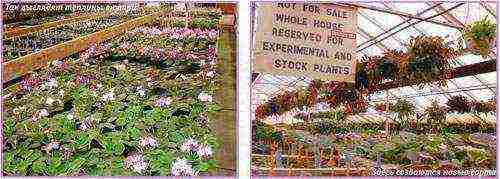
We continued to communicate by e-mail, met at exhibitions in the United States, and then in Russia. By the fall of 2004, we had established friendly relations, and this time Paul responded positively to my offer to sell new products of his company in Russia and the CIS through the Violet House, but most importantly, he agreed to transfer new varieties to Russia for breeding in six months before the start of their sale in the USA! This is the first time in the history of Lyndon Lyon's Greenhouses. Now you can refuse to send violets by mail.
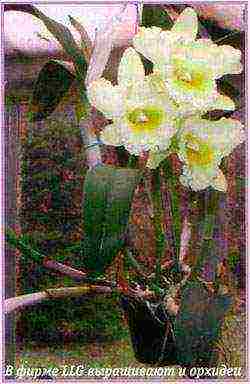 We flew to New York on Wednesday, rented a car, and spent the next two days visiting friends in Pennsylvania, New Jersey and Massachusetts. My wife Tatiana still recalls one meeting with delight. Our old friend Olga Neimark (Chernysheva), with whom we studied at the Faculty of Economics of Moscow State University, left for the United States with her family in the early 90s. True, she is not fond of growing violets, but she cooks great! And my wife read her book “Culinary Advices to Business Women” for several days avidly, putting aside Daria Dontsova's new detective in the middle. Now the edition can be purchased at the "House of Violets" store.
We flew to New York on Wednesday, rented a car, and spent the next two days visiting friends in Pennsylvania, New Jersey and Massachusetts. My wife Tatiana still recalls one meeting with delight. Our old friend Olga Neimark (Chernysheva), with whom we studied at the Faculty of Economics of Moscow State University, left for the United States with her family in the early 90s. True, she is not fond of growing violets, but she cooks great! And my wife read her book “Culinary Advices to Business Women” for several days avidly, putting aside Daria Dontsova's new detective in the middle. Now the edition can be purchased at the "House of Violets" store.
On Saturday morning we left Boston for Dolzhvil and in the afternoon we were already inspecting the greenhouses (there are three of them) by Lyndon Lyon's Greenhouses. They were built in 1954, 1956 and 1959. Since then, the technology of growing violets has been perfected and gives excellent results. At AVSA shows, only Paul Sorano sells only flowering rosettes, not cuttings and "babies" like other breeders! Therefore, it was interesting for us to see how his greenhouses are arranged, where Saintpaulias are grown. I will try to present our observations to the readers of "Uzambara Violet".
The largest greenhouse contains standard varieties of violets. Nearby, in a smaller greenhouse, there are miniature and ampelous ones. The farthest greenhouse turned out to be especially interesting: it grows varietal novelties, seedlings and various rare plants. There is a sign on the door - "For staff only". Regular visitors are not allowed there. We spent half a day in this greenhouse, examining and photographing everything that caught our attention.
Everyone knows that violets cannot stand direct sunlight, and the roofs of greenhouses are glass. To prevent the bright light from burning the delicate leaves, Paul paints the greenhouse roof several times throughout the year. The famous breeder B.M. Macuni's south windows were whitewashed. But Sorano has pink painted roof windows. It is known that the red rays of the solar spectrum stimulate the laying of peduncles. Therefore, the unusual color of the LLG greenhouse roof is one of the secrets of the constant and abundant flowering of Saintpaulias.
Greenhouse space is used very efficiently. Plants are grown on three levels. The racks, approximately 1.2 m high, contain the bulk of the blooming violets arranged in rows. So they are clearly visible to visitors, and it is convenient for the company's employees to work with them. The upper tier - more light-loving ampelous crops suspended in pots.These are mainly various representatives of the Gesneriaceae family, which, like violets, are included in the catalogs of Lyndon Lyon's Greenhouses. I really liked the multi-colored "Decembrists", or "Christmas cacti" as Paul calls them. In December, they bloom profusely, delighting with white, yellow, orange and crimson flowers. There are also many orchids next to the violets.
On the lower tier, under the main shelving, young plants are kept under fluorescent lamps. Since they are only gaining green mass, there are no special requirements for lighting.
Both for growing rosettes and for rooting cuttings in greenhouses, a landless mixture of peat, perlite and vermiculite is used. Previously, this mixture was made on the spot, but in recent years they have been buying ready-made ones. It is also offered to customers, but all components of the mixture can be purchased separately.
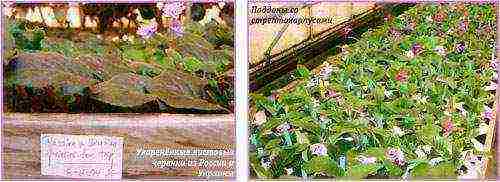
Violets are grown in small green octagonal pots with four wide sides and four narrow sides. The upper and lower diameters do not differ significantly. They are very convenient: stable, compact during shipment (there are more of them in the box).
When transplanting, the old leaves of Saintpaulia are cut off, exposing the stem of the plant, and the lower part of the earthen coma is cut off with a knife, like a piece of bread. The remaining part is again placed in the previous pot, the substrate is poured on top, covering the open part of the stem, from which new roots will go. Thus, the plant is rejuvenated, and after a while it begins to bloom profusely. Although the pots are not tall, the soil is about 1 cm undershot to the top edge. Paul explained that he was watering the violets from above with a hose. Water enters the pot and is gradually absorbed into the soil. If the container is completely filled with soil, then the moisture will drain away without getting to the roots of the plant.
However, LLG greenhouses also use bottom irrigation. The plant pots are placed on water-absorbing synthetic mats covered with black plastic wrap with many small holes. Water is supplied to the plants from the tray through the holes in the film. Thanks to the black coating, the mats do not become overgrown with green algae and, according to Paul, have served since the construction of the greenhouse. And the plastic wrap is changed once every 3-4 years.
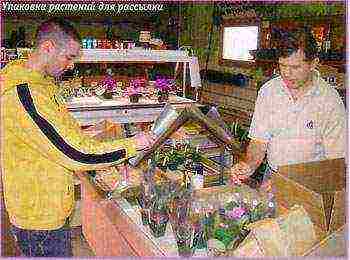 Although the area of greenhouses is relatively small, you can walk on them for a very long time, constantly discovering something new for yourself. After all, there are about three times more varieties of violets than indicated in the company's catalog. But the most interesting thing is concentrated in the greenhouse where ordinary visitors are not allowed. We spent a significant part of our time there.
Although the area of greenhouses is relatively small, you can walk on them for a very long time, constantly discovering something new for yourself. After all, there are about three times more varieties of violets than indicated in the company's catalog. But the most interesting thing is concentrated in the greenhouse where ordinary visitors are not allowed. We spent a significant part of our time there.
In this room are the plants selected for crossing and those on which pods with hybrid seeds ripen. Here, for the first time, the company's breeders observe the flowering of seedlings, most of which will be discarded, and only the best will have a chance to become new varieties. On the upper tier, there are boxes with rooted cuttings. Part of the greenhouse is occupied by chimeras and other rarities.
It was very pleasant to see here a box with leafy cuttings of Russian and Ukrainian varieties, planted by Paul on August 2, 2004, immediately after returning from a trip to Russia. All the cuttings took root and gave birth to children. One sapling even bloomed (in my opinion, this is a violet ‘White Nights’ by E.A. Arkhipova).
The greatest interest for us was the opportunity to look into the creative workshop of Lyndon Lyon's Greenhouses. After all, we were able to see the future, evaluate the seedlings, still unknown to anyone, - new products for 2006, 2007. There are many amazing violets among them. Discussing the seedlings we liked with Paul, we realized that the company's breeders are very attentive to each new variety. It must necessarily be different from existing cultivars. It can be any stroke, border, fantasy of a different color, a different color of the leaves, etc. Each of the LLG varieties has its own face.
Here is a seedling that looks like a beautiful 'Painted Desert' variety, but not coral, but lilac with a purple border.And here is a lilac cherry-tipped flower reminiscent of the ‘Music Box Dancer’. There is a violet similar to the ‘Rainbow’s Quiet Riot’, but with a wide white border. The next one is the spitting image of 'Ambiance', but with a "Geneva" around the edge. The masterpieces of the past have now acquired some new qualities and become even more beautiful. We have also seen seedlings that have no analogues. Paul especially singled out a specimen with large purple flowers, which are decorated with scarlet fantasy spots. Of the hundreds of seedlings on the rack, many in a year or two will become the company's novelties.
But the main purpose of our trip was LLG varieties, which will be released in 2005. Among them there are very interesting violets, photos of which are presented on the magazine tab. Of course, these are not exhibition specimens yet, but only young plants blooming for the first time. But the distinctive features of the new varieties are clearly visible.
‘Eastern Fun’. This variety has large crimson flowers with a two-tone fantasy - cherry and blue touches.
‘Golden Autumn’ - another lovely yellow violet of the firm. It is characterized by an unusual flower shape and a uniform yellow color in the center, without streaks and stripes.
‘High Jinks’... In the shape and color of the petals, the variety is very similar to the 'Twilight' violet, bred by E.A. Arkhipov, but this is a half-miniature.
‘Nome Fires’ similar to the ‘Astro’ variety, which recently appeared in Russia, with the same unusual two-tone fantasy, but in addition it has a slightly noticeable dark border.
‘Laser Celebration’ really resembles a dark sky colored with white and pink laser beams.
'Leading Lady'- an amazing four-colored violet, just a masterpiece! On the pink tone of the petals, salmon-colored rays emerge from the center. A wide crimson border is followed by a thin white edge. The flowers are very large.
'Velvet Gem' - semi-miniature variety. Fantasy cherry splashes over crimson flowers.
‘Western Wishes’ the shape of the very delicate flowers resembles a lotus. The petals are adorned with rare touches of blue fantasy.
Besides LLG, we visited the greenhouse of another American breeder, Ralph Robinson, known for his miniature varieties (Rob's series) and streptocarpus (Bristol's). His wife Olive is the creator of Ma's violets. What we saw there is a separate story.
Before leaving, we again visited the Sorano greenhouses to get a phytosanitary certificate from the state agricultural inspector for the import of plants into Russia, and set off on our way back. Now the violets brought by us are perfectly rooted, we are preparing them for the May exhibition in the "House of Violets".
